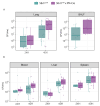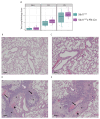Role of Liver Kinase 1B in Platelet Activation and Host Defense During Klebsiella pneumoniae-Induced Pneumosepsis
- PMID: 40332331
- PMCID: PMC12028316
- DOI: 10.3390/ijms26083714
Role of Liver Kinase 1B in Platelet Activation and Host Defense During Klebsiella pneumoniae-Induced Pneumosepsis
Abstract
Pneumonia is the most common cause of sepsis, with Klebsiella pneumoniae frequently implicated as a causative pathogen. Platelets play a crucial role in host defense during sepsis, and their activation is essential for effective immune responses, which is at least in part induced through activation of the collagen receptor glycoprotein (GP)VI. Platelets require energy for their activation, and Liver kinase B1 (LKB1) is a key regulator of energy metabolism. We sought to determine the role of LKB1 in platelet function and host response during K. pneumoniae-induced pneumosepsis. Platelet-specific-Lkb1-deficient mice were generated and compared to control littermates. Platelet counts were unaffected by Lkb1 deficiency in naïve mice. However, Lkb1-deficient platelets exhibited significant hyperreactivity to GPVI stimulation, an effect not observed after stimulation of the thrombin receptor protease-activated receptor 4. During K. pneumoniae infection, platelets of both Lkb1-deficient and control mice became equally hyporesponsive to GPVI stimulation, without differences between genotypes. Platelet-specific Lkb1 deficiency did not alter bacterial outgrowth or dissemination, inflammatory responses, or lung pathology. These findings suggest that while Lkb1 plays a role in regulating platelet activation in response to GPVI stimulation, it does not significantly impact platelet activation or the host response during pneumonia-induced sepsis.
Keywords: microbes–host interaction; microbial infection; molecular and cell biology.
Conflict of interest statement
The authors declare no conflicts of interest.
Figures



References
MeSH terms
Substances
Grants and funding
LinkOut - more resources
Full Text Sources
Medical

